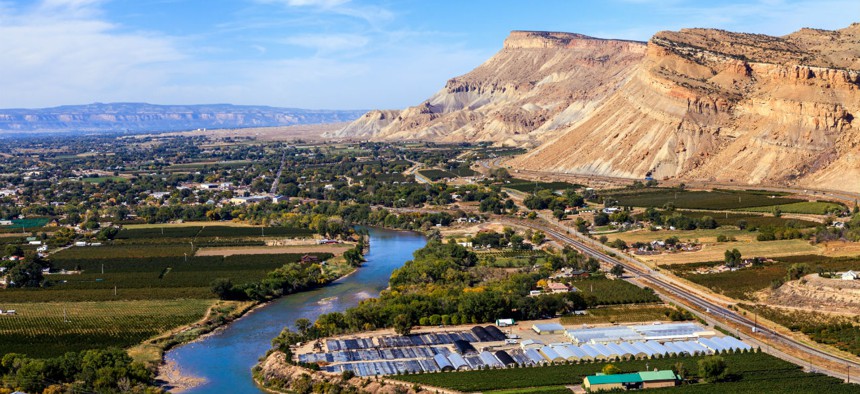
The Bureau of Land Management's new headquarters will be in Grand Junction, Colorado. By Paul Gana / Shutterstock.com
Interior Official: Land Bureau Relocations Are Not Intended to 'Drain the Swamp'
Department would like to retain all employees and has instituted a hiring freeze to ensure positions are available for those who don't want to move, official says.
The Trump administration on Tuesday defended itself against accusations that it is trying to shrink the size of the federal workforce by relocating offices out of Washington, D.C, saying it is instead looking to retain every employee.
The decision to relocate the Bureau of Land Management’s headquarters to Colorado and move hundreds of additional positions to western states was based entirely on operational concerns, William Perry Pendley, the senior official currently serving as BLM director, said at a hearing before the House Energy and Natural Resources Committee. The Interior Department is taking great pains to ensure no employees are forced to leave, Pendley said, noting employees will receive official relocation notices next week.
BLM and the entire Interior Department have implemented hiring freezes to ensure vacancies for bureau employees who do not wish to move west, Pendley said. He added Interior was “working aggressively” so that employees can either accept their relocation or find a new position within the department.
“Our desire is to not lose a single employee,” Pendley said. He added, however, that BLM has conducted no analysis to determine how many employees will actually leave, aside from a “rough estimate” based on historical data suggesting 25% of impacted employees would retire or separate from the agency.
He said in his time at BLM he has been “mightily impressed” with the agency’s career staff.
“I could not be more pleased with their work or their performance,” Pendley said. “I do not want to lose a single one of them. I’m not trying to drain the swamp, I’m trying to make it more possible for them to do their job.”
Pendley said the exact positions designated for relocation will be unveiled next week, with employees receiving notifications “promptly.” BLM will make Employee Assistance Program counselors available to staff and their families, and both EAP experts and human resources personnel will meet one-on-one with impacted workers to “be responsive to their needs.” Those who do move, he said, will benefit from a lower cost of living, shorter commutes, better access to recreational areas and “more fulfilling jobs.”
The Interior Department is planning to relocate about 250 Washington-based Bureau of Land Management employees to western states, including 27 who will serve at the agency’s new headquarters in Grand Junction, Colorado. Sixty-one employees will remain in D.C., moving from the current BLM building in Southeast D.C. to the Interior headquarters.
Every Democratic member who spoke at the hearing voiced reservations about the move, with several suggesting the relocation was in reality an effort to shed federal workers and ultimately dismantle BLM. Rep. Raul Grijalva, D-Ariz., cited acting White House Chief of Staff Mick Mulvaney, who said last month that relocating offices was a good way to shed federal employees.
“It’s hard to consider anything this administration does in good faith when they are so transparent about what their true motivations are,” Grijalva said. “What better way to eliminate the BLM than to drive out its staff.”
In defending the move, Pendley reiterated the benefits previously laid out by administration officials: the relocation will place decision-makers closer to the lands they manage, lower lease payments, reduce travel costs and generate savings by paying employees lower cost-of-living locality rates. He noted that half of BLM’s Senior Executive Service employees work in Washington, in addition to 70% of the General Schedule-15 workers. Moving career leaders west would benefit those workforces and enable BLM to address local issues more quickly, he said.
“The ones giving advice to our secretary, should they be here in these hallways or should they be out in the field?” Pendley said. “We can solve problems earlier in the process if we see them earlier.”
He also suggested the move would help recruit new employees going forward.
“I think we’re going to have an easier time hiring employees,” Pendley said. “It’s going to be better for the bureau.”
Several Republican members of the committee praised the decision for reducing power in Washington, D.C., saying they would applaud any effort to move federal workers outside of the nation’s capital. They agreed the relocations would better serve the needs of local communities in western states.
The Interior Department is still feuding with Congress over its authority to move forward with the relocation. Democratic appropriators have accused the administration of circumventing congressional intent and its prerequisites to justify the move. Interior has countered Congress missed its deadline to object and it will move forward using already appropriated funds.
“Congress gave us $5.6 million [for reorganization],” Pendley said. “The secretary decided to utilize that to move and we’re on the march.” He added he was appearing before lawmakers in part to convince them to meet BLM’s future funding needs for the relocation.
BLM also faced criticism for failing to consult stakeholders before the move, including Indian tribes. Tony Small, vice chairman of the Ute Indian Business Committee, who appeared at the hearing on behalf of 20 additional tribes located across six western states, said BLM’s claim that Interior held 11 consultations with stakeholders was misleading because those meetings did not involve the relocation specifically and no BLM employees were present.
Del. Eleanor Holmes Norton, D-D.C., called the relocation an “extreme proposal,” noting the Agriculture Department’s recent relocation of two bureaus to Kansas City led to 71% of employees declining to relocate. Ed Shepard, president of the Public Lands Foundation, a group composed largely of former BLM employees, said “many” bureau employees have indicated they will leave the agency. Some will seek jobs at other agencies, he said, while others will leave government altogether.







